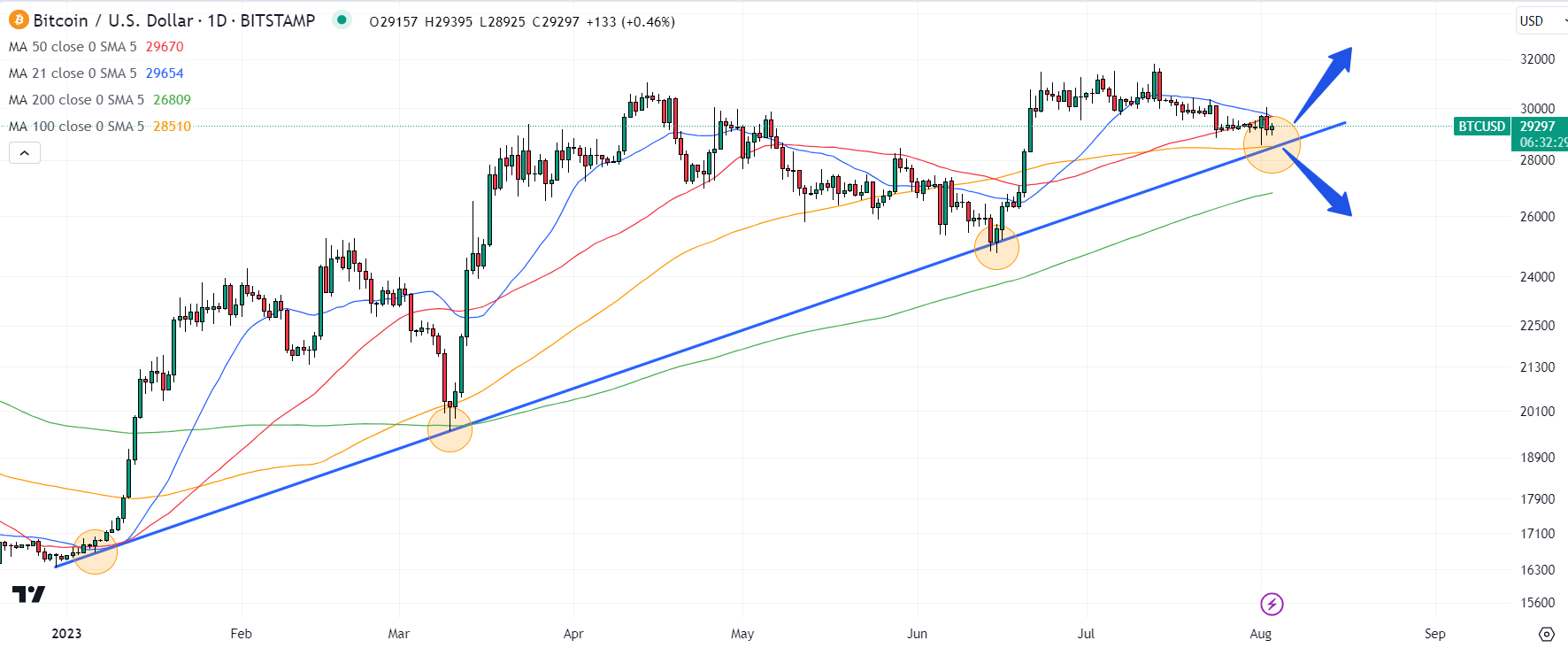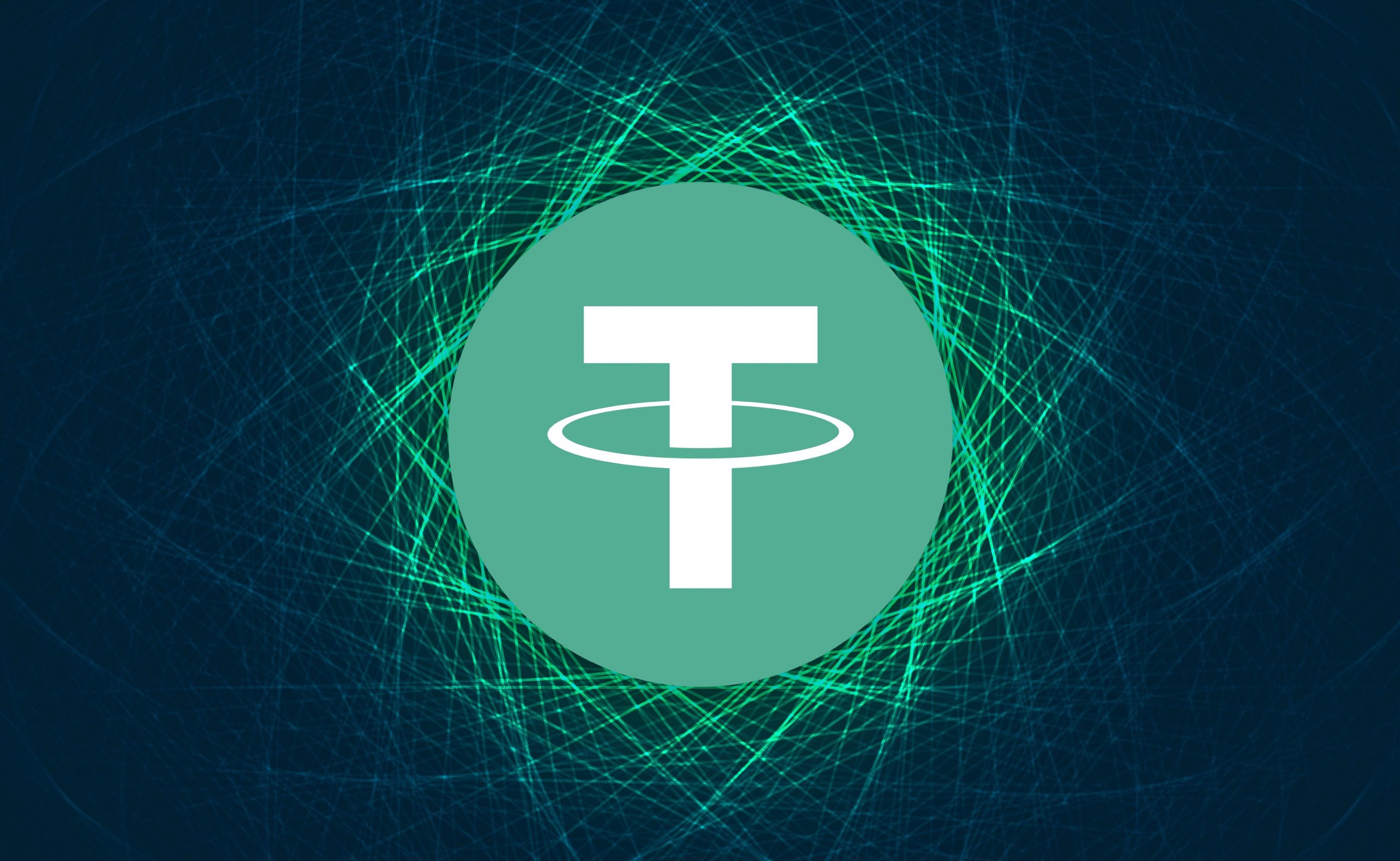The issuer of the world’s most popular USD-pegged stablecoin USDT, Tether, bought 1,529 bitcoin (BTC) worth $45.4 million in Q2, as per comments by the company’s CTO cited by Bitcoin Magazine.
The purchase shows that Tether is following through on a plan announced back in May to allocate 15% of quarterly profits to bitcoin.
The bitcoin price was little moved in response to the news and was last hovering in the $29,000s, within recent ranges and down about 8% from the yearly highs it hit back in July in the $31,800s.
Tether to Rival MicroStrategy Spot as Largest Corporate Whale?
In wake of its Q2 buys, Tether now owns 54,000 BTC worth around $1.58 billion.
By contrast, MicroStrategy – widely regarded as one of largest corporate bitcoin whales – currently holds 152,800 BTC, worth nearly $4.5 billion.
Tether’s stash should continue to grow rapidly as it continually funnels 15% of profits into BTC.
But MicroStrategy is also rapidly growing its holdings, meaning it may be tough to close the gap.
The US software giant added purchased 467 bitcoin worth $14.4 million in July alone and recently announced plans to sell as much as $750 million in stock, the proceeds of which would be used, in part, to fund fresh bitcoin purchases.
Assuming MicroStrategy was to raise $750 million and put it all into bitcoin, it could purchase over 25,600 at the current price.
What This Means for the Bitcoin (BTC) Market
When big companies like Tether and MicroStrategy adopt policies of continually investing a portion of their profits into bitcoin, it adds predictable and constant buy pressure to the market that should help underpin the bitcoin price in the long run.
For now, very few companies have bitcoin investment policies like Tether and MicroStrategy, but this is changing as the cryptocurrency gains broader acceptance as a mainstream asset.
The recent spot bitcoin ETF application from Wall Street giant BlackRock, and the wave of copycat applications from its rivals that followed, strongly suggest that we are moving towards a world of greater institutional acceptance of bitcoin as an asset worth investing in.
In the coming years, more and more major companies will likely join Tether and MicroStrategy and start building up their own BTC stash.
Meanwhile, large institutional investors will increasingly start allocating a portion of their portfolios toward the asset.
This is a strong argument in favor of bitcoin continuing to appreciate in price in the coming years.
Macro factors and themes such as the US SEC’s regulation by enforcement drive against the crypto industry could result in short-term swings in bitcoin market sentiment.
It’s not a given that bitcoin hold above the uptrend it has established for 2023 in the coming months.

But with optimism about institutional adoption rising, the macro situation seemingly heading in the right direction (inflation around the world is coming down and central bank hiking cycles appear to be nearing their end), and various widely followed on-chain indicators sending strong buy signals, it seems very likely that bitcoin is in the early stages of a new bull market.
How high could BTC go in the next two or three years?
It’s impossible to say for sure, but if bitcoin’s past market cycles are any guide, a rally into the $100,000s is certainly on the cards.
The issuer of the world’s most popular USD-pegged stablecoin USDT, Tether, bought 1,529 bitcoin (BTC) worth $45.4 million in Q2, as per comments by the company’s CTO cited by Bitcoin Magazine.
The purchase shows that Tether is following through on a plan announced back in May to allocate 15% of quarterly profits to bitcoin.
The bitcoin price was little moved in response to the news and was last hovering in the $29,000s, within recent ranges and down about 8% from the yearly highs it hit back in July in the $31,800s.
Tether to Rival MicroStrategy Spot as Largest Corporate Whale?
In wake of its Q2 buys, Tether now owns 54,000 BTC worth around $1.58 billion.
By contrast, MicroStrategy – widely regarded as one of largest corporate bitcoin whales – currently holds 152,800 BTC, worth nearly $4.5 billion.
Tether’s stash should continue to grow rapidly as it continually funnels 15% of profits into BTC.
But MicroStrategy is also rapidly growing its holdings, meaning it may be tough to close the gap.
The US software giant added purchased 467 bitcoin worth $14.4 million in July alone and recently announced plans to sell as much as $750 million in stock, the proceeds of which would be used, in part, to fund fresh bitcoin purchases.
Assuming MicroStrategy was to raise $750 million and put it all into bitcoin, it could purchase over 25,600 at the current price.
What This Means for the Bitcoin (BTC) Market
When big companies like Tether and MicroStrategy adopt policies of continually investing a portion of their profits into bitcoin, it adds predictable and constant buy pressure to the market that should help underpin the bitcoin price in the long run.
For now, very few companies have bitcoin investment policies like Tether and MicroStrategy, but this is changing as the cryptocurrency gains broader acceptance as a mainstream asset.
The recent spot bitcoin ETF application from Wall Street giant BlackRock, and the wave of copycat applications from its rivals that followed, strongly suggest that we are moving towards a world of greater institutional acceptance of bitcoin as an asset worth investing in.
In the coming years, more and more major companies will likely join Tether and MicroStrategy and start building up their own BTC stash.
Meanwhile, large institutional investors will increasingly start allocating a portion of their portfolios toward the asset.
This is a strong argument in favor of bitcoin continuing to appreciate in price in the coming years.
Macro factors and themes such as the US SEC’s regulation by enforcement drive against the crypto industry could result in short-term swings in bitcoin market sentiment.
It’s not a given that bitcoin hold above the uptrend it has established for 2023 in the coming months.

But with optimism about institutional adoption rising, the macro situation seemingly heading in the right direction (inflation around the world is coming down and central bank hiking cycles appear to be nearing their end), and various widely followed on-chain indicators sending strong buy signals, it seems very likely that bitcoin is in the early stages of a new bull market.
How high could BTC go in the next two or three years?
It’s impossible to say for sure, but if bitcoin’s past market cycles are any guide, a rally into the $100,000s is certainly on the cards.
